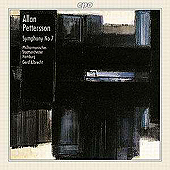
ESSENTIAL RECORDINGS

Allan Pettersson was born in Sweden in 1911, the year Mahler died, and passed away in 1980 after suffering most of his adult life from polyarthritis, an ailment which caused him constant severe pain and prevented him from being able to write down his own music starting around the time of his 6th symphony. But that didn't prevent him from composing 16 symphonies, 3 concertos, chamber works and song cycles. His determination and spirit were such that on top of his suffering and living in poverty most of his life, he also felt rejected by musical society in general because he didn't fit in with the "romantics" or the "modernists" because he was a strange combination of both camps, but that never stopped him from working feverishly, tucked away from the rest of the world.
You have probably guessed by now that his music is far from cheerful. Comparing Pettersson to his compatriot Kurt Atterberg, is like this: Atterberg's music is sometimes like a bright sunny day, full of colours and energy, while Pettersson's is like that dead time of night after midnight, with rain and fog rolling in.
Most of his symphonies are huge single-movement sagas, heavy statements of anger, hurt and a quest for answers. The 7th is built almost entirely upon an incessant, short, obsessive 2-note motif (almost like a limp) played mostly by the trombones and tuba. What is fascinating is how Pettersson can sustain this for almost an hour by building on it with stoic patience and brilliant writing. From the very beginning, everything seems dark and bleak, with occasional military overtones creeping in on the snare drums, and short bursts of energy from the orchestra, when suddenly at 17:10 there is a slight mood shift, as if a fever breaking or waking from a nightmare. At 30:49, truly beautiful string writing takes over and changes the atmosphere completely, albeit only for a moment because at 34:55 the nightmare returns to finish the night. The only thing that remains at the end of the symphony is the limp like motif from the beginning, repeating over and over with very high notes in the strings hovering over, until the end. Bleak, dark and beautiful all at the same time.
Composers like Pettersson should not be dismissed or forgotten. True, they are not to everyone's taste or fancy, and are often difficult to understand, but they are the true masters. They are the true, life affirming artists because they persevere in creating music, no matter the odds against them, simply because they want to and feel it is their duty to express, in music, the world around and within them.
The executives at CPO should be applauded for undertaking and recording all of Pettersson's symphonies, and also most of his other works.
The music forming my work is my own life, it's blessings, it's curses: in order to rediscover the song once sung by the soul. When will the angel come who restores the song to the soul, so simply and clearly, that a child will cease it's weeping? - Allan Pettersson
Jean-Yves Duperron